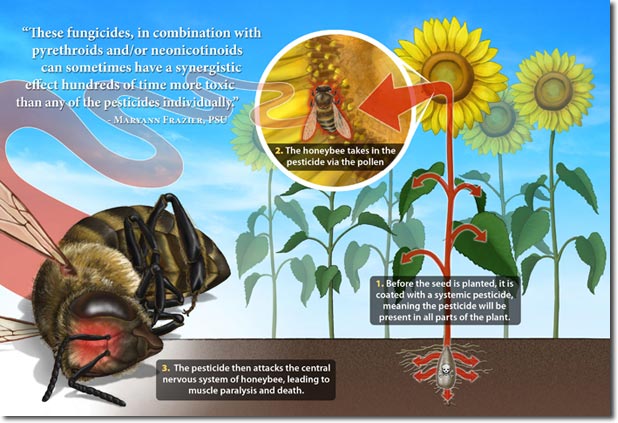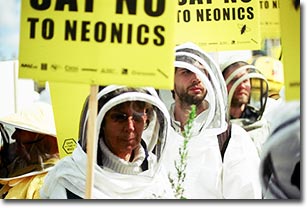Wild Side #11
Neonicotinoids: The New DDT?
2014
Neonicotinoids are the most widely used insecticides in the world. They've been
linked to the decline of honeybees. But scientists now say they also harm many
terrestrial, aquatic, and marine invertebrates. They damage sea urchin DNA,
suppress the immune systems of crabs, and affect the tunneling and reproductive
behavior of earthworms. They kill off the insects that many birds, amphibians, and
reptiles rely on for food. According to Scott Hoffman Black, Executive Director of
the Xerces Society, through the widespread use of these pesticides "we are killing
the underpinning of the food chain." In human blood studies, neonicotinoids are
linked to DNA damage and cell mutation.
Neonicotinoids command 30% of the global insecticide market with sales of over
$2.6 billion in 2009. Manufacturers argue that their pest-fighting power is indispensable
to agriculture. They were introduced in the 1990s to replace more damaging insecticides.
They are systemic and absorbed by the plant, making all parts of the plant —
including nectar and pollen — toxic to pests.

Neonicotinoids are widely used as seed treatments, applied as soil drench, or sprayed onto foliage. In the US, they are used on some 200 million acres of crop land — on almost all corn, canola, and half of all soybean crops as well as on many fruits and vegetables. They are also extensively used in home and garden products. They are persistent, water soluble, and now found in stream samples across the United States and Canada.

"We are witnessing a threat to the productivity of our natural and farmed environment equivalent to that posed by organophosphates or DDT", says Dr. Jean-Marc Bonmatin. Dr. Bonmatin is the lead author of an analysis of 800 peer-reviewed reports on the risk of neonicotinoids (and the systemic pesticide fipronil) completed in October 2014 by the Task Force on Systemic Pesticides, a group of independent scientists from 15 countries. DDT was widely promoted for pest control in the US after World War II but was subsequently banned due to both environmental and human health concerns.
For Further Study
- DDT 2.0 — by George Monbiot (14 August 2013)
- Neonicotinoids: The New DDT (on YouTube, on LinkTV)
- Neonicotinoids are the new DDT, and they're destroying our world — by Lance Johnson (14 August 2013)
- Neonicotinoids to be banned in American Northwest and Hawaii in effort to save pollinators — by Julie Wilson (31 July 2014)
- Confirmed: Neonicotinoids are collapsing honeybee colonies — by David Gutierrez (29 May 2014)
- Neonicotinoids are the new DDT killing the natural world — by George Monbiot (05 August 2013)
- Ban neonicotinoids now – to avert another silent spring — by George Monbiot (15 July 2014)
- Neonicotinoids are the new DDT — by Jaymi Heimbuch (06 August 2013)
Credits:
Permaculture NewsRendition:
20-January-2015Correspondence:
The Recall of the Wildmother_nature@the-recall-of-the-wild.org
The Recall of the Wild
